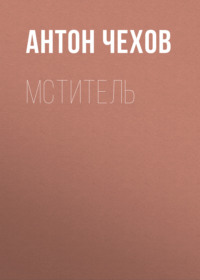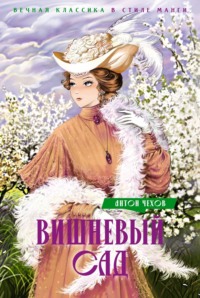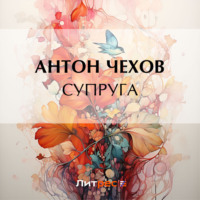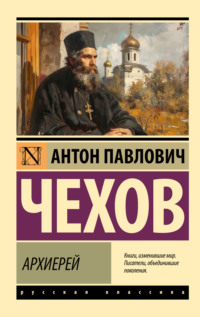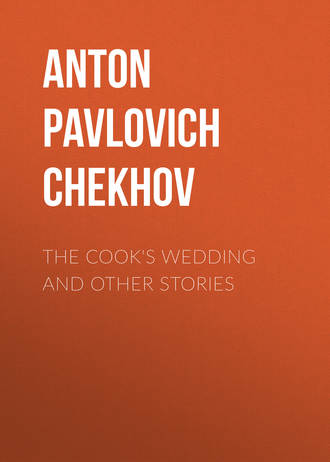 полная версия
полная версияThe Cook's Wedding and Other Stories
—
Half an hour afterwards, Kashtanka was in the street, following the people who smelt of glue and varnish. Luka Alexandritch staggered and instinctively, taught by experience, tried to keep as far from the gutter as possible.
"In sin my mother bore me," he muttered. "And you, Kashtanka, are a thing of little understanding. Beside a man, you are like a joiner beside a cabinetmaker."
Fedyushka walked beside him, wearing his father's cap. Kashtanka looked at their backs, and it seemed to her that she had been following them for ages, and was glad that there had not been a break for a minute in her life.
She remembered the little room with dirty wall-paper, the gander, Fyodor Timofeyitch, the delicious dinners, the lessons, the circus, but all that seemed to her now like a long, tangled, oppressive dream.
A CHAMELEON
THE police superintendent Otchumyelov is walking across the market square wearing a new overcoat and carrying a parcel under his arm. A red-haired policeman strides after him with a sieve full of confiscated gooseberries in his hands. There is silence all around. Not a soul in the square… The open doors of the shops and taverns look out upon God's world disconsolately, like hungry mouths; there is not even a beggar near them.
"So you bite, you damned brute?" Otchumyelov hears suddenly. "Lads, don't let him go! Biting is prohibited nowadays! Hold him! ah.. ah!"
There is the sound of a dog yelping. Otchumyelov looks in the direction of the sound and sees a dog, hopping on three legs and looking about her, run out of Pitchugin's timber-yard. A man in a starched cotton shirt, with his waistcoat unbuttoned, is chasing her. He runs after her, and throwing his body forward falls down and seizes the dog by her hind legs. Once more there is a yelping and a shout of "Don't let go!" Sleepy countenances are protruded from the shops, and soon a crowd, which seems to have sprung out of the earth, is gathered round the timber-yard.
"It looks like a row, your honour." says the policeman.
Otchumyelov makes a half turn to the left and strides towards the crowd.
He sees the aforementioned man in the unbuttoned waistcoat standing close by the gate of the timber-yard, holding his right hand in the air and displaying a bleeding finger to the crowd. On his half-drunken face there is plainly written: "I'll pay you out, you rogue!" and indeed the very finger has the look of a flag of victory. In this man Otchumyelov recognises Hryukin, the goldsmith. The culprit who has caused the sensation, a white borzoy puppy with a sharp muzzle and a yellow patch on her back, is sitting on the ground with her fore-paws outstretched in the middle of the crowd, trembling all over. There is an expression of misery and terror in her tearful eyes.
"What's it all about?" Otchumyelov inquires, pushing his way through the crowd. "What are you here for? Why are you waving your finger..? Who was it shouted?"
"I was walking along here, not interfering with anyone, your honour," Hryukin begins, coughing into his fist. "I was talking about firewood to Mitry Mitritch, when this low brute for no rhyme or reason bit my finger… You must excuse me, I am a working man… Mine is fine work. I must have damages, for I shan't be able to use this finger for a week, may be… It's not even the law, your honour, that one should put up with it from a beast… If everyone is going to be bitten, life won't be worth living.."
"H'm. Very good," says Otchumyelov sternly, coughing and raising his eyebrows. "Very good. Whose dog is it? I won't let this pass! I'll teach them to let their dogs run all over the place! It's time these gentry were looked after, if they won't obey the regulations! When he's fined, the blackguard, I'll teach him what it means to keep dogs and such stray cattle! I'll give him a lesson!.. Yeldyrin," cries the superintendent, addressing the policeman, "find out whose dog this is and draw up a report! And the dog must be strangled. Without delay! It's sure to be mad… Whose dog is it, I ask?"
"I fancy it's General Zhigalov's," says someone in the crowd.
"General Zhigalov's, h'm… Help me off with my coat, Yeldyrin.. it's frightfully hot! It must be a sign of rain… There's one thing I can't make out, how it came to bite you?" Otchumyelov turns to Hryukin. "Surely it couldn't reach your finger. It's a little dog, and you are a great hulking fellow! You must have scratched your finger with a nail, and then the idea struck you to get damages for it. We all know.. your sort! I know you devils!"
"He put a cigarette in her face, your honour, for a joke, and she had the sense to snap at him… He is a nonsensical fellow, your honour!"
"That's a lie, Squinteye! You didn't see, so why tell lies about it? His honour is a wise gentleman, and will see who is telling lies and who is telling the truth, as in God's sight… And if I am lying let the court decide. It's written in the law… We are all equal nowadays. My own brother is in the gendarmes.. let me tell you.."
"Don't argue!"
"No, that's not the General's dog," says the policeman, with profound conviction, "the General hasn't got one like that. His are mostly setters."
"Do you know that for a fact?"
"Yes, your honour."
"I know it, too. The General has valuable dogs, thoroughbred, and this is goodness knows what! No coat, no shape… A low creature. And to keep a dog like that!.. where's the sense of it. If a dog like that were to turn up in Petersburg or Moscow, do you know what would happen? They would not worry about the law, they would strangle it in a twinkling! You've been injured, Hryukin, and we can't let the matter drop… We must give them a lesson! It is high time.. !"
"Yet maybe it is the General's," says the policeman, thinking aloud. "It's not written on its face… I saw one like it the other day in his yard."
"It is the General's, that's certain!" says a voice in the crowd.
"H'm, help me on with my overcoat, Yeldyrin, my lad.. the wind's getting up… I am cold… You take it to the General's, and inquire there. Say I found it and sent it. And tell them not to let it out into the street… It may be a valuable dog, and if every swine goes sticking a cigar in its mouth, it will soon be ruined. A dog is a delicate animal… And you put your hand down, you blockhead. It's no use your displaying your fool of a finger. It's your own fault.."
"Here comes the General's cook, ask him.. Hi, Prohor! Come here, my dear man! Look at this dog… Is it one of yours?"
"What an idea! We have never had one like that!"
"There's no need to waste time asking," says Otchumyelov. "It's a stray dog! There's no need to waste time talking about it… Since he says it's a stray dog, a stray dog it is… It must be destroyed, that's all about it."
"It is not our dog," Prohor goes on. "It belongs to the General's brother, who arrived the other day. Our master does not care for hounds. But his honour is fond of them.."
"You don't say his Excellency's brother is here? Vladimir Ivanitch?" inquires Otchumyelov, and his whole face beams with an ecstatic smile. "'Well, I never! And I didn't know! Has he come on a visit?
"Yes."
"Well, I never… He couldn't stay away from his brother… And there I didn't know! So this is his honour's dog? Delighted to hear it… Take it. It's not a bad pup… A lively creature… Snapped at this fellow's finger! Ha-ha-ha… Come, why are you shivering? Rrr.. Rrrr… The rogue's angry.. a nice little pup."
Prohor calls the dog, and walks away from the timber-yard with her.
The crowd laughs at Hryukin.
"I'll make you smart yet!" Otchumyelov threatens him, and wrapping himself in his greatcoat, goes on his way across the square.
THE DEPENDENTS
MIHAIL PETROVITCH ZOTOV, a decrepit and solitary old man of seventy, belonging to the artisan class, was awakened by the cold and the aching in his old limbs. It was dark in his room, but the little lamp before the ikon was no longer burning. Zotov raised the curtain and looked out of the window. The clouds that shrouded the sky were beginning to show white here and there, and the air was becoming transparent, so it must have been nearly five, not more.
Zotov cleared his throat, coughed, and shrinking from the cold, got out of bed. In accordance with years of habit, he stood for a long time before the ikon, saying his prayers. He repeated "Our Father," "Hail Mary," the Creed, and mentioned a long string of names. To whom those names belonged he had forgotten years ago, and he only repeated them from habit. From habit, too, he swept his room and entry, and set his fat little four-legged copper samovar. If Zotov had not had these habits he would not have known how to occupy his old age.
The little samovar slowly began to get hot, and all at once, unexpectedly, broke into a tremulous bass hum.
"Oh, you've started humming!" grumbled Zotov. "Hum away then, and bad luck to you!"
At that point the old man appropriately recalled that, in the preceding night, he had dreamed of a stove, and to dream of a stove is a sign of sorrow.
Dreams and omens were the only things left that could rouse him to reflection; and on this occasion he plunged with a special zest into the considerations of the questions: What the samovar was humming for? and what sorrow was foretold by the stove? The dream seemed to come true from the first. Zotov rinsed out his teapot and was about to make his tea, when he found there was not one teaspoonful left in the box.
"What an existence!" he grumbled, rolling crumbs of black bread round in his mouth. "It's a dog's life. No tea! And it isn't as though I were a simple peasant: I'm an artisan and a house-owner. The disgrace!"
Grumbling and talking to himself, Zotov put on his overcoat, which was like a crinoline, and, thrusting his feet into huge clumsy golosh-boots (made in the year 1867 by a bootmaker called Prohoritch), went out into the yard. The air was grey, cold, and sullenly still. The big yard, full of tufts of burdock and strewn with yellow leaves, was faintly silvered with autumn frost. Not a breath of wind nor a sound. The old man sat down on the steps of his slanting porch, and at once there happened what happened regularly every morning: his dog Lyska, a big, mangy, decrepit-looking, white yard-dog, with black patches, came up to him with its right eye shut. Lyska came up timidly, wriggling in a frightened way, as though her paws were not touching the earth but a hot stove, and the whole of her wretched figure was expressive of abjectness. Zotov pretended not to notice her, but when she faintly wagged her tail, and, wriggling as before, licked his golosh, he stamped his foot angrily.
"Be off! The plague take you!" he cried. "Con-found-ed bea-east!"
Lyska moved aside, sat down, and fixed her solitary eye upon her master.
"You devils!" he went on. "You are the last straw on my back, you
Herods."
And he looked with hatred at his shed with its crooked, overgrown roof; there from the door of the shed a big horse's head was looking out at him. Probably flattered by its master's attention, the head moved, pushed forward, and there emerged from the shed the whole horse, as decrepit as Lyska, as timid and as crushed, with spindly legs, grey hair, a pinched stomach, and a bony spine. He came out of the shed and stood still, hesitating as though overcome with embarrassment.
"Plague take you," Zotov went on. "Shall I ever see the last of you, you jail-bird Pharaohs!.. I wager you want your breakfast!" he jeered, twisting his angry face into a contemptuous smile. "By all means, this minute! A priceless steed like you must have your fill of the best oats! Pray begin! This minute! And I have something to give to the magnificent, valuable dog! If a precious dog like you does not care for bread, you can have meat."
Zotov grumbled for half an hour, growing more and more irritated. In the end, unable to control the anger that boiled up in him, he jumped up, stamped with his goloshes, and growled out to be heard all over the yard:
"I am not obliged to feed you, you loafers! I am not some millionaire for you to eat me out of house and home! I have nothing to eat myself, you cursed carcases, the cholera take you! I get no pleasure or profit out of you; nothing but trouble and ruin, Why don't you give up the ghost? Are you such personages that even death won't take you? You can live, damn you! but I don't want to feed you! I have had enough of you! I don't want to!"
Zotov grew wrathful and indignant, and the horse and the dog listened. Whether these two dependents understood that they were being reproached for living at his expense, I don't know, but their stomachs looked more pinched than ever, and their whole figures shrivelled up, grew gloomier and more abject than before… Their submissive air exasperated Zotov more than ever.
"Get away!" he shouted, overcome by a sort of inspiration. "Out of my house! Don't let me set eyes on you again! I am not obliged to keep all sorts of rubbish in my yard! Get away!"
The old man moved with little hurried steps to the gate, opened it, and picking up a stick from the ground, began driving out his dependents. The horse shook its head, moved its shoulder-blades, and limped to the gate; the dog followed him. Both of them went out into the street, and, after walking some twenty paces, stopped at the fence.
"I'll give it you!" Zotov threatened them.
When he had driven out his dependents he felt calmer, and began sweeping the yard. From time to time he peeped out into the street: the horse and the dog were standing like posts by the fence, looking dejectedly towards the gate.
"Try how you can do without me," muttered the old man, feeling as though a weight of anger were being lifted from his heart. "Let somebody else look after you now! I am stingy and ill-tempered… It's nasty living with me, so you try living with other people.. Yes.."
After enjoying the crushed expression of his dependents, and grumbling to his heart's content, Zotov went out of the yard, and, assuming a ferocious air, shouted:
"Well, why are you standing there? Whom are you waiting for? Standing right across the middle of the road and preventing the public from passing! Go into the yard!"
The horse and the dog with drooping heads and a guilty air turned towards the gate. Lyska, probably feeling she did not deserve forgiveness, whined piteously.
"Stay you can, but as for food, you'll get nothing from me! You may die, for all I care!"
Meanwhile the sun began to break through the morning mist; its slanting rays gilded over the autumn frost. There was a sound of steps and voices. Zotov put back the broom in its place, and went out of the yard to see his crony and neighbour, Mark Ivanitch, who kept a little general shop. On reaching his friend's shop, he sat down on a folding-stool, sighed sedately, stroked his beard, and began about the weather. From the weather the friends passed to the new deacon, from the deacon to the choristers; and the conversation lengthened out. They did not notice as they talked how time was passing, and when the shop-boy brought in a big teapot of boiling water, and the friends proceeded to drink tea, the time flew as quickly as a bird. Zotov got warm and felt more cheerful.
"I have a favour to ask of you, Mark Ivanitch," he began, after the sixth glass, drumming on the counter with his fingers. "If you would just be so kind as to give me a gallon of oats again to-day.."
From behind the big tea-chest behind which Mark Ivanitch was sitting came the sound of a deep sigh.
"Do be so good," Zotov went on; "never mind tea – don't give it me to-day, but let me have some oats… I am ashamed to ask you, I have wearied you with my poverty, but the horse is hungry."
"I can give it you," sighed the friend – "why not? But why the devil do you keep those carcases? – tfoo! – Tell me that, please. It would be all right if it were a useful horse, but – tfoo! – one is ashamed to look at it… And the dog's nothing but a skeleton! Why the devil do you keep them?"
"What am I to do with them?"
"You know. Take them to Ignat the slaughterer – that is all there is to do. They ought to have been there long ago. It's the proper place for them."
"To be sure, that is so!.. I dare say!."
"You live like a beggar and keep animals," the friend went on. "I don't grudge the oats… God bless you. But as to the future, brother.. I can't afford to give regularly every day! There is no end to your poverty! One gives and gives, and one doesn't know when there will be an end to it all."
The friend sighed and stroked his red face.
"If you were dead that would settle it," he said. "You go on living, and you don't know what for… Yes, indeed! But if it is not the Lord's will for you to die, you had better go somewhere into an almshouse or a refuge."
"What for? I have relations. I have a great-niece.."
And Zotov began telling at great length of his great-niece Glasha, daughter of his niece Katerina, who lived somewhere on a farm.
"She is bound to keep me!" he said. "My house will be left to her, so let her keep me; I'll go to her. It's Glasha, you know.. Katya's daughter; and Katya, you know, was my brother Panteley's stepdaughter… You understand? The house will come to her.. Let her keep me!"
"To be sure; rather than live, as you do, a beggar, I should have gone to her long ago."
"I will go! As God's above, I will go. It's her duty."
When an hour later the old friends were drinking a glass of vodka,
Zotov stood in the middle of the shop and said with enthusiasm:
"I have been meaning to go to her for a long time; I will go this very day."
"To be sure; rather than hanging about and dying of hunger, you ought to have gone to the farm long ago."
"I'll go at once! When I get there, I shall say: Take my house, but keep me and treat me with respect. It's your duty! If you don't care to, then there is neither my house, nor my blessing for you! Good-bye, Ivanitch!"
Zotov drank another glass, and, inspired by the new idea, hurried home. The vodka had upset him and his head was reeling, but instead of lying down, he put all his clothes together in a bundle, said a prayer, took his stick, and went out. Muttering and tapping on the stones with his stick, he walked the whole length of the street without looking back, and found himself in the open country. It was eight or nine miles to the farm. He walked along the dry road, looked at the town herd lazily munching the yellow grass, and pondered on the abrupt change in his life which he had only just brought about so resolutely. He thought, too, about his dependents. When he went out of the house, he had not locked the gate, and so had left them free to go whither they would.
He had not gone a mile into the country when he heard steps behind him. He looked round and angrily clasped his hands. The horse and Lyska, with their heads drooping and their tails between their legs, were quietly walking after him.
"Go back!" he waved to them.
They stopped, looked at one another, looked at him. He went on, they followed him. Then he stopped and began ruminating. It was impossible to go to his great-niece Glasha, whom he hardly knew, with these creatures; he did not want to go back and shut them up, and, indeed, he could not shut them up, because the gate was no use.
"To die of hunger in the shed," thought Zotov. "Hadn't I really better take them to Ignat?"
Ignat's hut stood on the town pasture-ground, a hundred paces from the flagstaff. Though he had not quite made up his mind, and did not know what to do, he turned towards it. His head was giddy and there was a darkness before his eyes..
He remembers little of what happened in the slaughterer's yard. He has a memory of a sickening, heavy smell of hides and the savoury steam of the cabbage-soup Ignat was sipping when he went in to him. As in a dream he saw Ignat, who made him wait two hours, slowly preparing something, changing his clothes, talking to some women about corrosive sublimate; he remembered the horse was put into a stand, after which there was the sound of two dull thuds, one of a blow on the skull, the other of the fall of a heavy body. When Lyska, seeing the death of her friend, flew at Ignat, barking shrilly, there was the sound of a third blow that cut short the bark abruptly. Further, Zotov remembers that in his drunken foolishness, seeing the two corpses, he went up to the stand, and put his own forehead ready for a blow.
And all that day his eyes were dimmed by a haze, and he could not even see his own fingers.
WHO WAS TO BLAME?
As my uncle Pyotr Demyanitch, a lean, bilious collegiate councillor, exceedingly like a stale smoked fish with a stick through it, was getting ready to go to the high school, where he taught Latin, he noticed that the corner of his grammar was nibbled by mice.
"I say, Praskovya," he said, going into the kitchen and addressing the cook, "how is it we have got mice here? Upon my word! yesterday my top hat was nibbled, to-day they have disfigured my Latin grammar.. At this rate they will soon begin eating my clothes!
"What can I do? I did not bring them in!" answered Praskovya.
"We must do something! You had better get a cat, hadn't you?"
"I've got a cat, but what good is it?"
And Praskovya pointed to the corner where a white kitten, thin as a match, lay curled up asleep beside a broom.
"Why is it no good?" asked Pyotr Demyanitch.
"It's young yet, and foolish. It's not two months old yet."
"H'm… Then it must be trained. It had much better be learning instead of lying there."
Saying this, Pyotr Demyanitch sighed with a careworn air and went out of the kitchen. The kitten raised his head, looked lazily after him, and shut his eyes again.
The kitten lay awake thinking. Of what? Unacquainted with real life, having no store of accumulated impressions, his mental processes could only be instinctive, and he could but picture life in accordance with the conceptions that he had inherited, together with his flesh and blood, from his ancestors, the tigers (vide Darwin). His thoughts were of the nature of day-dreams. His feline imagination pictured something like the Arabian desert, over which flitted shadows closely resembling Praskovya, the stove, the broom. In the midst of the shadows there suddenly appeared a saucer of milk; the saucer began to grow paws, it began moving and displayed a tendency to run; the kitten made a bound, and with a thrill of blood-thirsty sensuality thrust his claws into it.
When the saucer had vanished into obscurity a piece of meat appeared, dropped by Praskovya; the meat ran away with a cowardly squeak, but the kitten made a bound and got his claws into it… Everything that rose before the imagination of the young dreamer had for its starting-point leaps, claws, and teeth.. The soul of another is darkness, and a cat's soul more than most, but how near the visions just described are to the truth may be seen from the following fact: under the influence of his day-dreams the kitten suddenly leaped up, looked with flashing eyes at Praskovya, ruffled up his coat, and making one bound, thrust his claws into the cook's skirt. Obviously he was born a mouse catcher, a worthy son of his bloodthirsty ancestors. Fate had destined him to be the terror of cellars, store-rooms and cornbins, and had it not been for education.. we will not anticipate, however.
On his way home from the high school, Pyotr Demyanitch went into a general shop and bought a mouse-trap for fifteen kopecks. At dinner he fixed a little bit of his rissole on the hook, and set the trap under the sofa, where there were heaps of the pupils' old exercise-books, which Praskovya used for various domestic purposes. At six o'clock in the evening, when the worthy Latin master was sitting at the table correcting his pupils' exercises, there was a sudden "klop!" so loud that my uncle started and dropped his pen. He went at once to the sofa and took out the trap. A neat little mouse, the size of a thimble, was sniffing the wires and trembling with fear.
"Aha," muttered Pyotr Demyanitch, and he looked at the mouse malignantly, as though he were about to give him a bad mark. "You are cau – aught, wretch! Wait a bit! I'll teach you to eat my grammar!"
Having gloated over his victim, Poytr Demyanitch put the mouse-trap on the floor and called:



